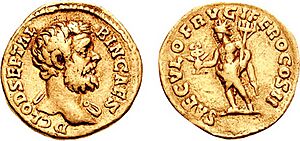Clodius Albinus facts for kids
Quick facts for kids Clodius Albinus |
|||||||||
|---|---|---|---|---|---|---|---|---|---|

Bust in the Capitoline Museums, Rome
|
|||||||||
| Born | c. 150 Hadrumetum, Roman Africa (Sousse, Tunisia) |
||||||||
| Died | 19 February 197 Lugdunum |
||||||||
|
|||||||||
Decimus Clodius Albinus (born around 150 AD – died February 19, 197 AD) was a powerful Roman general. He tried to become Roman emperor between 193 and 197 AD. Soldiers in Roman Britain and Hispania (modern-day Spain and Portugal) declared him emperor. This happened after Emperor Pertinax was killed in 193 AD, a time known as the "Year of the Five Emperors".
At first, Albinus worked with another person who wanted to be emperor, Septimius Severus. But by 196 AD, they became enemies and started a civil war. Albinus died in battle the next year.
Contents
Clodius Albinus's Life Story
Growing Up in Roman Africa
Albinus was born in a city called Hadrumetum. This city was in Africa Province (which is now Sousse, Tunisia). He came from an important Roman family. An old book called Historia Augusta says his skin was very white. Because of this, he supposedly got the nickname Albinus, which means "white."
His Military Career
Albinus loved military life from a young age. He joined the army and quickly showed he was a good soldier. In 175 AD, he served bravely during a rebellion against Emperor Marcus Aurelius. The Emperor noticed Albinus's skills. He even wrote letters praising Albinus's military experience. Marcus Aurelius said Albinus helped keep his soldiers loyal. He also planned for Albinus to become a Roman consul, a high-ranking official.
Later, Emperor Commodus gave Albinus command of soldiers in Gallia Belgica (parts of modern France and Belgium). Then he sent him to Roman Britain. A false rumor spread that Commodus had died. Albinus told his soldiers that Commodus was a bad ruler. He said it would be good for the Roman Empire if the Roman Senate got back its old power. The Senate liked what Albinus said. But Emperor Commodus did not. He tried to remove Albinus from his command. However, Albinus kept his position. He remained in command until after Commodus and his successor Pertinax were killed in 193 AD.
Working with Septimius Severus
After Emperor Pertinax was killed, the Praetorian Guard (the emperor's bodyguards) sold the throne. They sold it to a rich senator named Didius Julianus. But this caused many problems. Soldiers in different parts of the empire rebelled.
- Pescennius Niger was declared emperor by soldiers in Syria.
- Septimius Severus was declared emperor by soldiers in Illyricum and Pannonia.
- Albinus was declared emperor by armies in Britain and Gaul.
A civil war began. At first, Albinus and Septimius Severus worked together. Severus had taken control of Rome. Albinus added Severus's family name, Septimius, to his own. He also accepted the title of Caesar, which meant he was Severus's chosen successor. They even shared the role of Roman consul in 194 AD.
Albinus remained in charge of much of the western part of the Empire. He had the support of three legions (large groups of soldiers) from Britain and one from Spain. Didius Julianus was later killed by order of the Senate. This was because the Senate feared Septimius Severus's growing power. After this, Severus turned his attention to Pescennius Niger. Niger was defeated and died in 194 AD. Severus then wanted to become the only ruler of the Roman Empire.
Albinus saw that he was in danger. He prepared for a fight. He barely escaped being killed by a messenger sent by Severus. After this, Albinus took command of his large army. It is said he had about 150,000 soldiers.
Becoming Emperor
In late 196 AD, Albinus learned that Severus had named his older son, Caracalla, as his successor. Severus also convinced the Senate to declare Albinus an enemy of Rome. With nothing left to lose, Albinus gathered his soldiers in Britain. He declared himself emperor, using the full title Imperator Caesar Decimus Clodius Septimius Albinus Augustus. He then crossed from Britain into Gaul (modern-day France). He brought a large part of the British army with him.
Albinus defeated one of Severus's generals. This allowed him to use the military resources of Gaul. He made Lugdunum (modern-day Lyon, France) his main base. However, he could not get the support of the soldiers stationed along the Rhine River.
On February 19, 197 AD, Albinus's army met Severus's army. This was at the Battle of Lugdunum. It was a very tough battle. Some historians say there were 150,000 soldiers on each side. In the end, Albinus was defeated. He was captured and then executed by Severus's orders. Severus at first pardoned Albinus's wife and two sons. But he quickly changed his mind. All of Albinus's family members were also killed. The city of Lugdunum was looted. Severus also punished Albinus's supporters very harshly.
About His Life
People say that Albinus wrote a book about farming. He also wrote a collection of short, entertaining stories.
We do not know the name of Albinus's wife. The old book Historia Augusta mentions he had a baby son named Pescennius Princus. But some historians believe this name might not be real.
See also
 In Spanish: Clodio Albino para niños
In Spanish: Clodio Albino para niños
 | Laphonza Butler |
 | Daisy Bates |
 | Elizabeth Piper Ensley |


